A brief update on what members of the OceanStates team have been up to in the past weeks, while offices and borders have been closed to prevent the further spread of COVID-19.
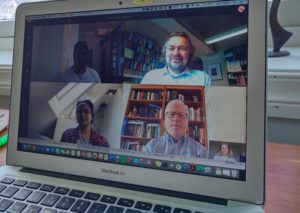
Ashneel, Edvard, Vandhna, Ernst and Miriam meeting online in May 2020
Since mid-March, the University of Bergen has been closed to most employees and students to ensure social distancing during the worst of the Coronavirus pandemic. Field research and conferences planned for 2020 have been put on hold and virtual interaction has been the rule. Like countless others around the world, the OceanStates team in Bergen has been working individually from home and meeting online once a week to share experiences and work progress, and discuss topics that connect each other’s varied work and disciplines.
![]()
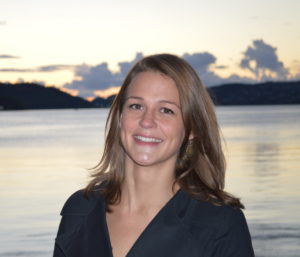 While most of us were in Bergen in March when the outbreak escalated, some of our members were temporarily working abroad. Camilla Borrevik, our postdoctoral fellow from the Department of Social Anthropology and the Deputy Director of OceanStates, was in Suva, Fiji, where she had accepted a temporary position at the United Nations. In her work for OceanStates, Camilla follows the United Nations Climate Change conferences – which you can read more about in her blogpost from December on the most recent Climate Change conference – COP25 in Madrid. The team looks very much forward to having her back in our (more or less virtual) midst!
While most of us were in Bergen in March when the outbreak escalated, some of our members were temporarily working abroad. Camilla Borrevik, our postdoctoral fellow from the Department of Social Anthropology and the Deputy Director of OceanStates, was in Suva, Fiji, where she had accepted a temporary position at the United Nations. In her work for OceanStates, Camilla follows the United Nations Climate Change conferences – which you can read more about in her blogpost from December on the most recent Climate Change conference – COP25 in Madrid. The team looks very much forward to having her back in our (more or less virtual) midst!
![]()
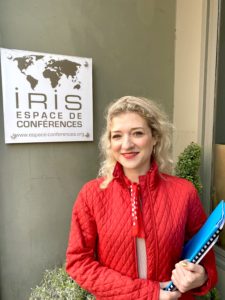 We also look forward to the return of our postdoctoral fellow from the Faculty of Law, Joanna Siekiera, who was in Paris for work at the onset of the global outbreak. Joanna’s work focuses on maritime law and sovereignties in the Pacific. In this context, France is of particular interest as it still has a colonial presence in the Pacific region. France controls a vast maritime area in the Pacific – more than 7 million square kilometres of ocean space – through its Pacific collectivities French Polynesia, New Caledonia and Wallis and Futuna. Along with its own domestic maritime space, these areas combined make France the second largest maritime power in the world. There are significant economic and political advantages to this power, and Joanna argues that ‘France was and always will be reluctant to give away the area of key global importance in climate change and biodiversity’ (Siekiera 2020).
We also look forward to the return of our postdoctoral fellow from the Faculty of Law, Joanna Siekiera, who was in Paris for work at the onset of the global outbreak. Joanna’s work focuses on maritime law and sovereignties in the Pacific. In this context, France is of particular interest as it still has a colonial presence in the Pacific region. France controls a vast maritime area in the Pacific – more than 7 million square kilometres of ocean space – through its Pacific collectivities French Polynesia, New Caledonia and Wallis and Futuna. Along with its own domestic maritime space, these areas combined make France the second largest maritime power in the world. There are significant economic and political advantages to this power, and Joanna argues that ‘France was and always will be reluctant to give away the area of key global importance in climate change and biodiversity’ (Siekiera 2020).
![]()
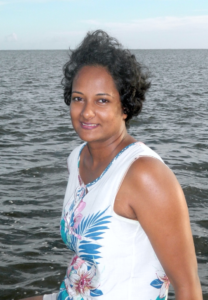
Back in Bergen, Vandhna Kumar, our postdoctoral fellow from the Geophysical Institute, has started analysing sea level simulations from the latest set of climate models (CMIP6) from home. Climate models can be described as mathematical representations of the Earth’s climate system, and are the primary tools used by scientists today to understand and project changes in climate. While these models generally perform well at global scales, climate models are less accurate when it comes to smaller islands. This is an important issue for the Pacific region, where the great number of islands are too small to be well-represented in climate models. Addressing and amending this issue is a main focus in Vandhna’s work, as she aims to create reliable predictions of how much the sea level is actually going to rise in the Pacific within the coming decades and towards the end of the century.
![]()
 His aim is to expand the reliability of weather forecasts from about a week to up to a few months. One area of relevance in his work is the Madden-Julian Oscillation (MJO), which in regions near the equator is the most common source of sub-seasonal variability. During these past few weeks, Ashneel has been downloading the data he needs from home, with a particular focus on precipitation and salinity data and the relationship between the two.
His aim is to expand the reliability of weather forecasts from about a week to up to a few months. One area of relevance in his work is the Madden-Julian Oscillation (MJO), which in regions near the equator is the most common source of sub-seasonal variability. During these past few weeks, Ashneel has been downloading the data he needs from home, with a particular focus on precipitation and salinity data and the relationship between the two.
![]()
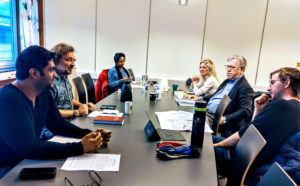
“The way we were” // discussion unfolds with interest during one of our final meetings before lockdown in February. Photo: Miriam Ladstein
As offices begin to reopen, we are looking forward to seeing everyone back in their offices and meeting in person again!